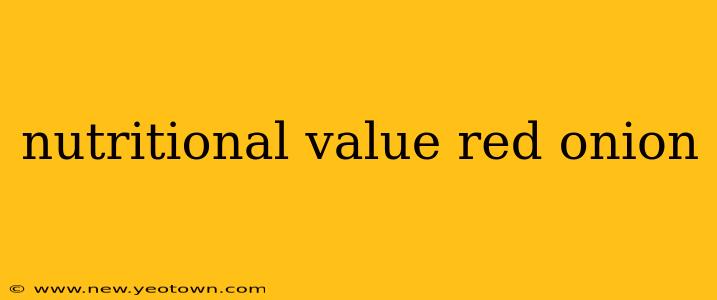The humble red onion, a staple in kitchens worldwide, is far more than just a pungent addition to salads and salsas. This vibrant bulb packs a surprising nutritional punch, offering a wealth of health benefits often overlooked. Let's peel back the layers (pun intended!) and explore the nutritional value of this often-underestimated vegetable.
What are the nutritional benefits of red onions?
Red onions are nutritional powerhouses, boasting a diverse array of vitamins, minerals, and antioxidants. Unlike their white or yellow counterparts, red onions contain anthocyanins, the pigments responsible for their deep crimson hue. These anthocyanins are potent antioxidants linked to a reduced risk of chronic diseases. But the benefits extend far beyond antioxidants. Red onions are a good source of vitamin C, a crucial vitamin for immune function, and they also contribute folate, essential for cell growth and development. Furthermore, they provide dietary fiber, crucial for digestive health and maintaining a healthy weight.
Are red onions good for your heart?
Absolutely! The compounds within red onions, particularly the quercetin flavonoid, have been linked to improved heart health. Quercetin possesses potent anti-inflammatory and antioxidant properties. These properties help combat oxidative stress, a major contributor to heart disease. Studies have suggested that regular consumption of red onions may help lower blood pressure and cholesterol levels, thus reducing the risk of cardiovascular problems. Think of incorporating red onions into your diet as a delicious, natural way to support your heart’s well-being.
What vitamins and minerals are in red onions?
Red onions are a surprisingly good source of several essential vitamins and minerals. As mentioned, they are a source of Vitamin C, essential for immune function and collagen production. They also provide a decent amount of Vitamin B6, crucial for brain development and function. In terms of minerals, red onions contain potassium, an electrolyte vital for maintaining proper fluid balance and blood pressure regulation. They also offer manganese, essential for bone health and metabolism, and folate, vital for cell growth and development. This diverse nutrient profile makes red onions a valuable addition to any healthy diet.
How many calories are in a red onion?
A medium-sized red onion (about 100 grams) contains approximately 40 calories. This makes it a very low-calorie food, perfect for those watching their weight. The low calorie count coupled with its high fiber content makes the red onion a filling and satisfying addition to meals, promoting satiety and potentially aiding in weight management. It’s a true diet-friendly powerhouse.
Are red onions anti-inflammatory?
Yes, indeed! The anti-inflammatory properties of red onions stem primarily from their rich content of anthocyanins and quercetin. These compounds help combat inflammation throughout the body. Chronic inflammation is linked to a wide range of health issues, including heart disease, cancer, and arthritis. By including red onions in your diet, you can contribute to reducing overall inflammation and potentially mitigating the risk of these conditions. This makes them a truly powerful addition to an anti-inflammatory diet.
Conclusion: A Delicious and Nutritious Addition to Your Diet
The red onion, often relegated to the side of the plate, deserves a prominent role in your healthy eating plan. Its vibrant color hints at its incredible nutritional value, offering a treasure trove of vitamins, minerals, and potent antioxidants. From supporting heart health to boosting immunity and combating inflammation, the red onion is a true culinary and nutritional champion. So, the next time you reach for this flavorful bulb, remember you’re not just adding flavor – you're adding a powerful boost to your overall well-being.

